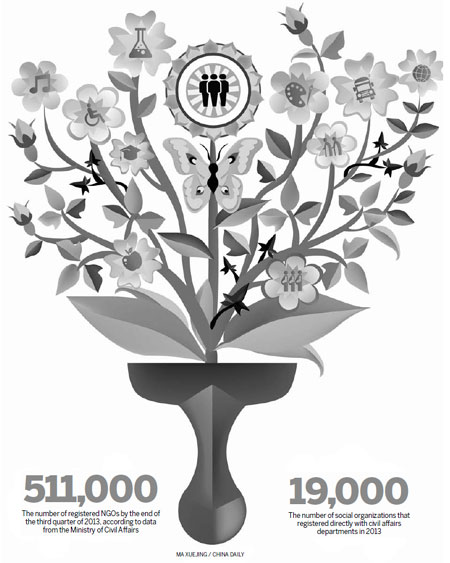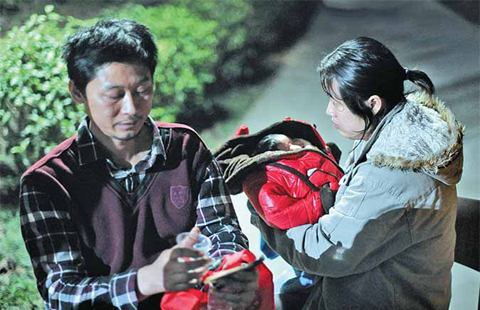Reforms give NGOs a level playing field
Updated: 2014-03-31 08:35
By He Dan (China Daily)
|
|||||||||||

New rules relating to registration and donations are expected to see social organizations play a greater role in the provision of services, as He Dan reports.
It took 10 years for Zheng Xiaojie to obtain legal recognition of the nonprofit organization she founded with her husband in 2003.
"The whole process from application to permission being granted took just seven days!" said Zheng, who is secretary-general of the Beijing Hongdandan Education and Culture Exchange Center, an organization dedicated to improving the quality of life for the visually impaired.
Until May 21, 2013, Beijing Hongdandan was registered as a company, a common practice for many grassroots social organizations that are unable to find a governmental agency to act as their supervisor, a precondition for those wishing to register as a nonprofit organization.
"In the past, we had to try hard to explain to potential cooperators and donors why we were a nonprofit group but were registered as a business," Zheng said.
"When we acquired a legal identity as an NGO, it felt as though the bonds that had constricted us had become looser and we were no longer worried or concerned about our awkward identity," she said.
There are about 16.91 million visually impaired people in China, equal to the entire population of the Netherlands.
"Visually challenged people have the same needs to access information, art and culture, but society has ignored them and failed to provide sufficient resources," Zheng said.
For example, among all Beijing's tourist hot spots, only the former residence of Prince Gong, a statesman during the Qing Dynasty (1644-1911), provides dedicated guide maps for the blind, she said, adding that although many NGOs in China are devoted to improving medical care and rehabilitation of those with disabilities, few have worked to remove the information barriers that hamper the visually impaired.
Every Saturday, Zheng's Xinmu Cinema, located in a courtyard in Dongcheng district, plays free movies for the visually challenged, who listen to the film's dialogue while volunteers explain the visual aspects.
Beijing Hongdandan also invites broadcasters and volunteers to record audio books, which are then distributed to public museums and schools for the blind.
Direct registration
The good news for Zheng came when Vice-Premier Ma Kai announced that four types of NGO - industrial associations, charities, community services, and organizations dedicated to the promotion of technology - would be allowed to register directly with civil affairs departments and would no longer be required to be affiliated with a government backer.
To date, 26 provinces and regions have implemented the new regulations, and more than 10 provincial governments have piloted the outsourcing of public services to social organizations.
Statistics from the Ministry of Civil Affairs show that more than 19,000 social organizations registered directly with civil affairs departments in 2013, while the central government has invested around 400 million yuan ($64.5 million) to support 470 projects run by social organizations.
Today's Top News
Xi pledges to bolster ties with EU, Belgium
Putin calls Obama to talk Ukraine
Chinese plane spots 3 objects
Xi defends national defense buildup
Turkey labels YouTube leak a 'plot'
DPRK lashes out at ROK 'gangsters'
World's longest-held death row inmate freed
China, Germany to build yuan center
Hot Topics
Lunar probe , China growth forecasts, Emission rules get tougher, China seen through 'colored lens', International board,
Editor's Picks

|

|

|

|

|

|





